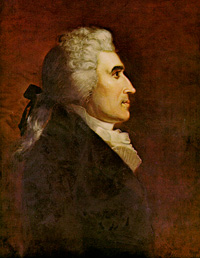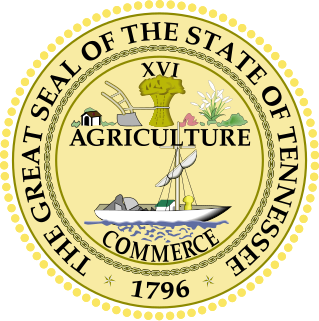
The 1796 United States presidential election was the third quadrennial presidential election. It was held from Friday, November 4 to Wednesday, December 7, 1796. It was the first contested American presidential election, the first presidential election in which political parties played a dominant role, and the only presidential election in which a president and vice president were elected from opposing tickets. Incumbent Vice President John Adams of the Federalist Party defeated former Secretary of State Thomas Jefferson of the Democratic-Republican Party.

The 5th United States Congress was a meeting of the legislative branch of the United States federal government, consisting of the United States Senate and the United States House of Representatives. It met at Congress Hall in Philadelphia, Pennsylvania, from March 4, 1797, to March 4, 1799, during the first two years of John Adams' presidency.

William Charles Cole Claiborne was an American politician, best known as the first non-colonial governor of Louisiana. He also has the distinction of possibly being the youngest member of the United States Congress in U.S. history, although reliable sources differ about his age.
Joseph Kerr was a Democratic-Republican politician from Ohio who served in the United States Senate.

William Cocke was an American lawyer, pioneer, and statesman. He has the distinction of having served in the state legislatures of four different states: Virginia, North Carolina, Tennessee, and Mississippi, and was one of the first two United States senators for Tennessee.

Elections to the United States House of Representatives for the 5th Congress took place in the various states took place between August 12, 1796, and October 15, 1797. The first session was convened on May 15, 1797, at the proclamation of the new President of the United States, John Adams. Since Kentucky and Tennessee had not yet voted, they were unrepresented until the second session.
Julius W. Blackwell was an American politician and a member of the United States House of Representatives that represented fourth and third districts of Tennessee in the United States House of Representatives.

The 4th United States Congress was a meeting of the legislative branch of the United States federal government, consisting of the United States Senate and the United States House of Representatives. It met at Congress Hall in Philadelphia, Pennsylvania, from March 4, 1795, to March 4, 1797, during the last two years of George Washington's presidency. The apportionment of seats in the House of Representatives was based on the First Census of the United States in 1790. The Senate had a Federalist majority, and the House had a Democratic-Republican majority.
Events from the year 1796 in the United States.
The United States Senate elections of 1808 and 1809 were elections that had the Federalist Party gain one seat in the United States Senate, and which coincided with the 1808 presidential election. The Federalists had gone into the elections with such a small share of Senate seats that even if they had won every election, they would have still remained a minority caucus.
The United States Senate elections of 1796 and 1797 were elections for the United States Senate which, coinciding with John Adams's election as President, had the ruling Federalist Party gain one seat.

The 1800 United States House of Representatives elections in New York were held from April 29 to May 1, 1800, to elect ten U.S. Representatives to represent the State of New York in the United States House of Representatives of the 7th United States Congress.

Due to Vermont's election law requiring a majority to secure a congressional seat, the 1st district required three ballots to choose a winner.

The 1797 United States Senate election in Pennsylvania was held on February 16, 1797. Incumbent James Ross was re-elected by the Pennsylvania General Assembly to the United States Senate.
Tennessee was admitted June 1, 1796. The first member of the U.S. House of Representatives was elected October 15, 1796 and seated December 5, 1796.

The 1796 United States elections elected the members of the 5th United States Congress. The election took place during the beginning stages of the First Party System, as the Federalist Party and the Democratic-Republican Party clashed over the states' rights, the financial policies of Treasury Secretary Alexander Hamilton, and the recently ratified Jay Treaty. The Federalists maintained control of the Senate, and won control of the House and the presidency.

This is a list of elections in the U.S. state of Tennessee.











